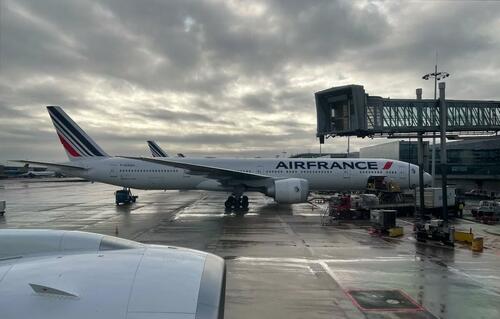
It's been a week full of absurd news and this certainly is a fitting end to it.
At a time when workers around the world are striking and demanding higher pay left and right to keep up with soaring prices, the Air France pilot union is doing the same... only with a twist: this strike isn’t due to any current labor issues between the union and company, but rather due to a new government bill that’s currently under consideration; as such the pilots are about to go on strike over a government’s proposed ban on strikes.
As View from the Wing reports, the French government is considering a ban on strikes “over fixed periods, up to 60 days per year" and the French Senate will debate the proposed bill April 9th. In France, strikes are often timed to maximize the impact they have on customers, so the government’s goal is to presumably limit strikes over the busiest periods, especially in the transportation sector (the upcoming Summer Olympics in Paris may also factor into this).
Meanwhile, the SPAF pilot union (Syndicat des Pilotes du groupe Air France), which represents pilots at Air France, believes that Air France is not public transport and not engaged in public service, and thus their right to strike shouldn’t be constrained to benefit the public. Doing otherwise “would “relegate” the country to an authoritarian state” according to the pilots who clearly are unaware that France was relegated to an authoritarian state long ago.
And since the union “cannot accept” such "authoritarian" legislation they are calling on all French pilots to strike April 15-16.
The pilots maintain that there’s a separation between the airline and society, and that they don’t owe a duty to the French public – yet their own actions undermine the claim. They say Air France is private, this new potential policy is government, and they’re protesting the government policy by striking… against the airline.
Meanwhile, it’s surreal to suggest that:
- Air France isn’t an artifact of the state The French government owns nearly 30% of Air France KLM. The airline received approximately $17 billion in subsidies during the pandemic. They have received grants of favorable slots at both Paris-Orly and Charles de Gaulle airports, which are property rights gifted by the government and which exclude competition.
- French labor law doesn’t already interfere in employee-employer relations French labor law is already tilted heavily towards striking workers. The pilot union doesn’t claim that this risks tyranny. Airlines cannot generally hire replacement workers (and can only reassign duties to existing workers). Here the French state gives labor tremendous leverage over employers through force of law. The French Labor Code also imposes severe conditions on an employer’s ability to dismiss workers, from severance pay to a worker’s right to challenge dismissal in labor courts. It requires consultation with a Social and Economic Committee and developing job-saving plans and plans to minimize the impact of layoffs through transfers and retraining where more than 10 employees are involved.
The French government is the primary owner of Air France and heavily involved in French labor relations. New legislation threatens to tinker with rules that would limit harm to French citizens from strikes at this business that’s been deemed systemically and socially important (hence billions in subsidies from citizens). With this change, if it were to come to pass, French law would still tilt heavily towards workers.
Meanwhile, Air France pilots are not the downtrodden souls union workers normally want to be seen as: "these aren’t factory workers during the industrial revolution", as VFTW points out. On average Air France pilots earn around $160,000 with senior captains frequently earning in excess of $250,000 per year. And since French per capita GDP is half that of the United States, these numbers are even more impressive.
Bottom line: French pilots striking to push for government policies protecting their privileged positions at the expense of average citizens is an awkward position to be in, but come to think of it not all that different than ALPA in the United States.
It’s been a week full of absurd news and this certainly is a fitting end to it.
At a time when workers around the world are striking and demanding higher pay left and right to keep up with soaring prices, the Air France pilot union is doing the same… only with a twist: this strike isn’t due to any current labor issues between the union and company, but rather due to a new government bill that’s currently under consideration; as such the pilots are about to go on strike over a government’s proposed ban on strikes.
As View from the Wing reports, the French government is considering a ban on strikes “over fixed periods, up to 60 days per year” and the French Senate will debate the proposed bill April 9th. In France, strikes are often timed to maximize the impact they have on customers, so the government’s goal is to presumably limit strikes over the busiest periods, especially in the transportation sector (the upcoming Summer Olympics in Paris may also factor into this).
Meanwhile, the SPAF pilot union (Syndicat des Pilotes du groupe Air France), which represents pilots at Air France, believes that Air France is not public transport and not engaged in public service, and thus their right to strike shouldn’t be constrained to benefit the public. Doing otherwise “would “relegate” the country to an authoritarian state” according to the pilots who clearly are unaware that France was relegated to an authoritarian state long ago.
And since the union “cannot accept” such “authoritarian” legislation they are calling on all French pilots to strike April 15-16.
The pilots maintain that there’s a separation between the airline and society, and that they don’t owe a duty to the French public – yet their own actions undermine the claim. They say Air France is private, this new potential policy is government, and they’re protesting the government policy by striking… against the airline.
Meanwhile, it’s surreal to suggest that:
- Air France isn’t an artifact of the state The French government owns nearly 30% of Air France KLM. The airline received approximately $17 billion in subsidies during the pandemic. They have received grants of favorable slots at both Paris-Orly and Charles de Gaulle airports, which are property rights gifted by the government and which exclude competition.
- French labor law doesn’t already interfere in employee-employer relations French labor law is already tilted heavily towards striking workers. The pilot union doesn’t claim that this risks tyranny. Airlines cannot generally hire replacement workers (and can only reassign duties to existing workers). Here the French state gives labor tremendous leverage over employers through force of law. The French Labor Code also imposes severe conditions on an employer’s ability to dismiss workers, from severance pay to a worker’s right to challenge dismissal in labor courts. It requires consultation with a Social and Economic Committee and developing job-saving plans and plans to minimize the impact of layoffs through transfers and retraining where more than 10 employees are involved.
The French government is the primary owner of Air France and heavily involved in French labor relations. New legislation threatens to tinker with rules that would limit harm to French citizens from strikes at this business that’s been deemed systemically and socially important (hence billions in subsidies from citizens). With this change, if it were to come to pass, French law would still tilt heavily towards workers.
Meanwhile, Air France pilots are not the downtrodden souls union workers normally want to be seen as: “these aren’t factory workers during the industrial revolution”, as VFTW points out. On average Air France pilots earn around $160,000 with senior captains frequently earning in excess of $250,000 per year. And since French per capita GDP is half that of the United States, these numbers are even more impressive.
Bottom line: French pilots striking to push for government policies protecting their privileged positions at the expense of average citizens is an awkward position to be in, but come to think of it not all that different than ALPA in the United States.
Loading…




